Inside the 2025 Tech Salary Landscape: The Data Behind the Dollars
When you’re trying to figure out where to take your tech career next, knowing which roles actually pay well can make all the difference. Rather than relying on intuition, it’s better to follow the data to make an informed decision.
Jobright has gathered the latest data from active job listings across hundreds of thousands of company career pages and major job platforms to analyze the 2025 tech salary landscape.
In this article, we’ll see how much of a role experience plays in compensation, what specializations are most in demand, and what this means for you as a jobseeker. Let’s begin!
Experience Pays — Big Time
Here’s a table of salary ranges in tech based on experience level.
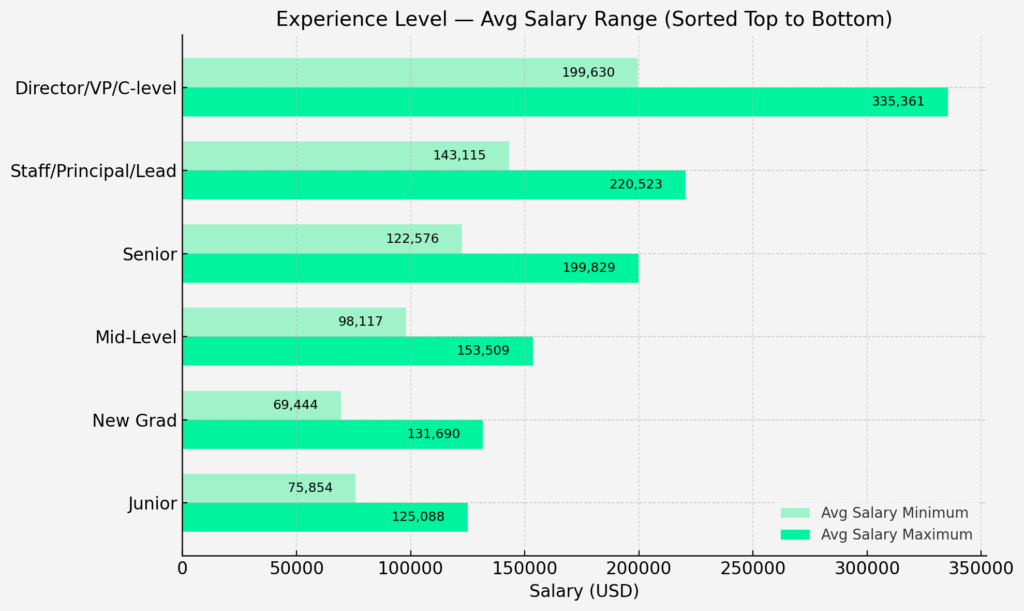
As expected, there’s a clear upward trend in salaries as experience increases. We can notice this in key transition points: from mid-level to senior, you see a +$46K jump; from senior to staff/lead, +$20K; from staff/lead to director/VP, over +$115K!
However, beyond this, there are two valuable insights we gain from this data table.
- High earning potential starts early (for some): New grads have a surprisingly high max salary ($131K), eclipsing juniors at $125K. This suggests that top companies (like FAANGs or startups with equity) are willing to invest heavily in top talent early on.
- Salary range widens at higher levels: As roles become more senior, compensation becomes more variable. The gap between min and max salary at the C-level is over $135K. This means that as you move up the ladder, factors like role scope, equity, and company size play a bigger role in overall compensation than just experience.
As this shows, experience is important, but it isn’t everything. Possessing an in-demand skill can earn you more than simply having more years under your belt. Now, let’s go into more detail and look at which specializations pay the most in various tech categories.
Which Specializations Pay the Most?
Around the 3 to 5 year mark, many professionals decide which specialization they should go for. This can have a huge effect on their future income. So, let’s see which specializations pay the most in tech in 2025.
Software Engineering
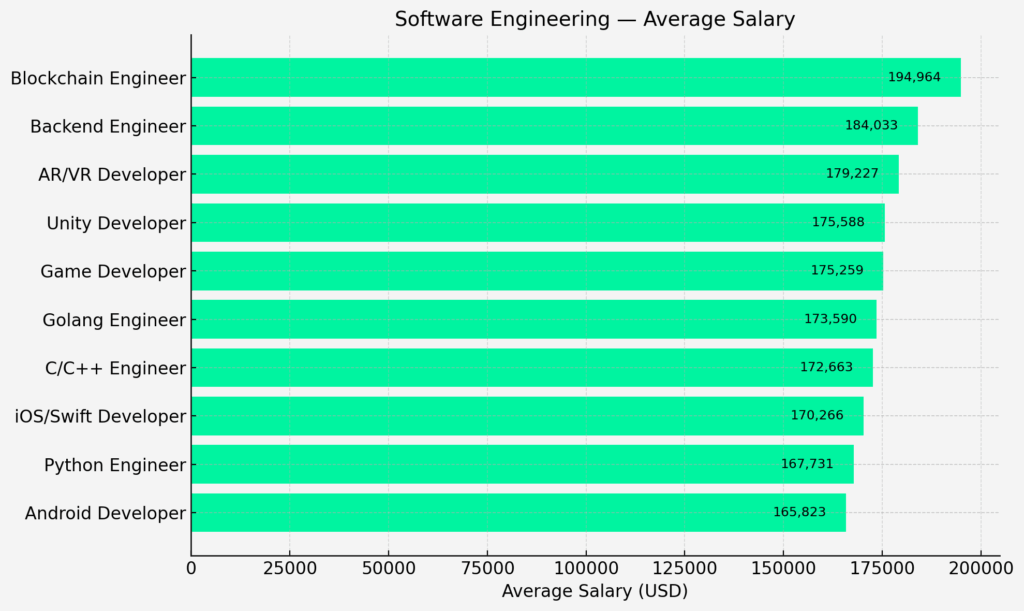
Let’s begin with the most well-paid profession in tech: software engineers. Here, the most lucrative jobs are blockchain engineer, backend engineer, and AR/VR developer.
Blockchain and AR/VR are both emerging, cutting-edge technologies and those who can offer know-how in these deserve premiums. Often, skill scarcity can have a major impact on pay.
However, your skill doesn’t have to be some cool new thing for you to be paid well for it. As we can see with the backend engineer role, mature technologies provide stable but moderate compensation as well.
Data
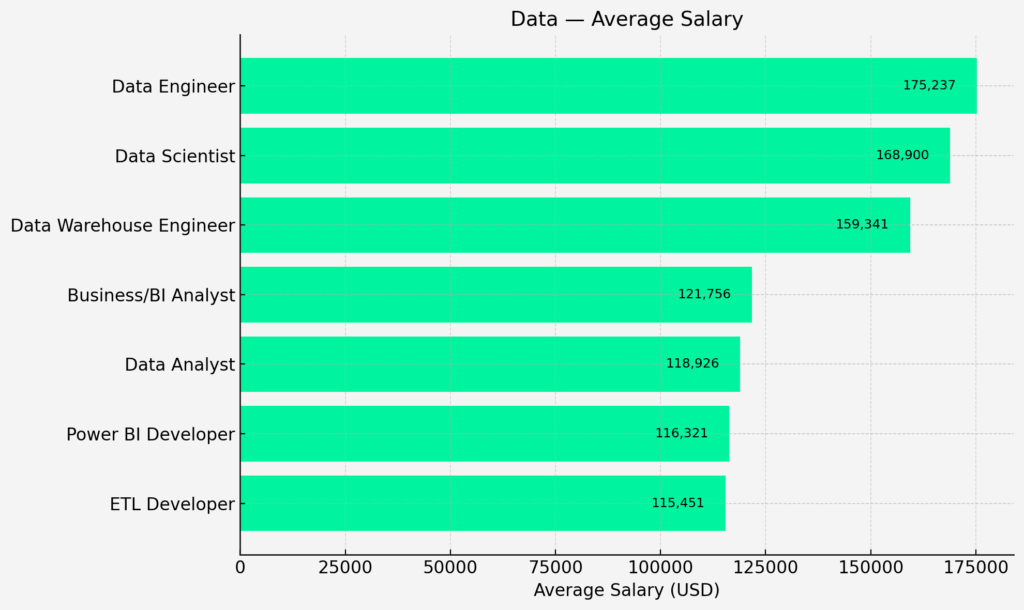
So, what do we see here? Data engineer tops the list with an average salary of $175K, well above data analyst roles with a $50K+ gap. Specialised roles like ETL developer and data warehouse engineer also pay quite well, showing that expertise in backend data systems pays more than general analysis.
Data scientists being behind data engineers is also worth noting. At one point it was considered the most glamorous data role but now it lags behind data engineer by around $7K. Overall, this suggests that the closer a role is to building and scaling data systems, the more companies are willing to pay for it.
Product Management
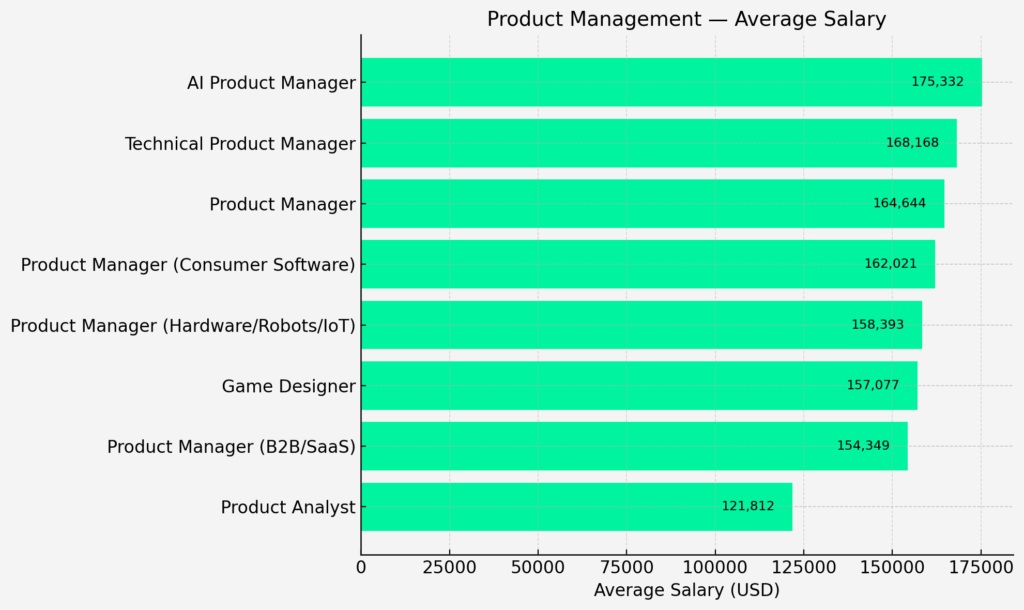
When it comes to product management, the most well-paid roles are AI product managers and technical PMs, from around $175K to $168K. In contrast, product analysts and product managers for SaaS and B2B are the lowest paid. The trend here is easy to spot: the more technical the PM role, the more it pays.
This can be good to keep in mind when you’re choosing a specialization. Being tech savvy can be a defining trait. The AI PM’s top spot reflects this perfectly. Overall, it’s clear that PMs with technical expertise are being paid accordingly.
Marketing
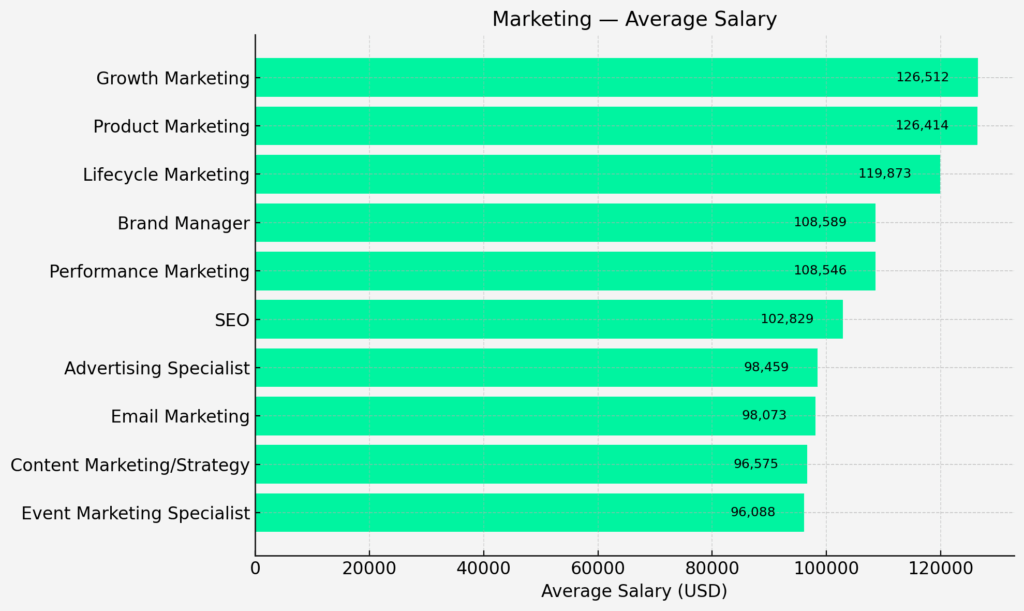
Of all the categories we’ve discussed so far, marketing offers the lowest specialization premium. The highest-paid role only offers around $30K over the lowest. So, unfortunately, there isn’t much upward room for growth in this category.
Marketing offers the lowest average salaries overall as well. These roles are crucial for companies to grow and acquire new users but less compensated compared to more tech-heavy positions.
What This Means For You as a Jobseeker
Reading all of this can feel overwhelming if you don’t know what to do next, so here are some actions you can take.
- Identify high-paying specializations in your field and pursue them. For example, if you’re a product manager, you can go for the role of AI product manager. Or if you’re a software engineer, you can look into blockchain engineering.
- Make a plan to successfully transition into that role in the future, keeping in mind salary jumps at key levels like Mid to Senior or Senior to Lead.
- Set learning goals so you can upskill and master the technical tools and systems required for higher-paying roles (like SQL, cloud platforms, backend frameworks, etc.).
Currently, in 2025, AI, AR/VR, and blockchain are the best things to invest your time in. Those who specialize in them command increasing premiums.
Unfortunately, it’s impossible to say what’s popular and in demand today will still be so in the coming years. But with the right mindset, which includes adaptability and continuous learning, it’s possible to create a balance where you can earn a stable salary while also capitalizing on cutting-edge tech of the future.
Looking Beyond the Numbers
Of course, at the end of the day, it’s not all about money.
Yes, salary data provides valuable benchmarks that you can use in negotiations and deciding your future path. However, it won’t help in terms of overall job satisfaction.
So, you need to also consider other factors as well. This includes how meaningful you find the work, if the workplace culture is positive, what growth opportunities you have, and so on. Keep these in mind as well when you choose your job.
